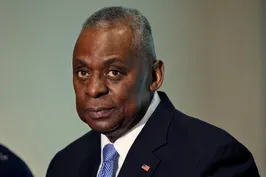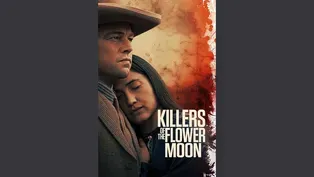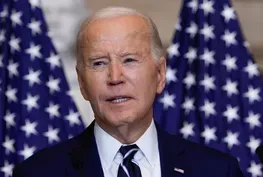
Why Universal Music Group is pulling songs from TikTok
Clip: 2/1/2024 | 8m 20sVideo has Closed Captions
Why Universal Music Group is pulling songs from TikTok
More than a billion users around the world may find that TikTok is a bit less fun than it was just a day ago. It’s tied to a major showdown between the social media app and the world’s biggest record label, Universal Music Group, which has removed its music from TikTok. John Yang discussed the dispute with Ben Sisario of The New York Times.
Problems with Closed Captions? Closed Captioning Feedback
Problems with Closed Captions? Closed Captioning Feedback
Major corporate funding for the PBS News Hour is provided by BDO, BNSF, Consumer Cellular, American Cruise Lines, and Raymond James. Funding for the PBS NewsHour Weekend is provided by...

Why Universal Music Group is pulling songs from TikTok
Clip: 2/1/2024 | 8m 20sVideo has Closed Captions
More than a billion users around the world may find that TikTok is a bit less fun than it was just a day ago. It’s tied to a major showdown between the social media app and the world’s biggest record label, Universal Music Group, which has removed its music from TikTok. John Yang discussed the dispute with Ben Sisario of The New York Times.
Problems with Closed Captions? Closed Captioning Feedback
How to Watch PBS News Hour
PBS News Hour is available to stream on pbs.org and the free PBS App, available on iPhone, Apple TV, Android TV, Android smartphones, Amazon Fire TV, Amazon Fire Tablet, Roku, Samsung Smart TV, and Vizio.
Providing Support for PBS.org
Learn Moreabout PBS online sponsorshipWILLIAM BRANGHAM: More than one billion users around the world may find that TikTok is a bit less fun than it was just yesterday.
As John Yang tells us, it's tied to a major showdown between TikTok and the world's biggest record label.
JOHN YANG: One of the world's most popular video sharing apps is suddenly a lot quieter without some of the world's most popular music.
Starting today, songs licensed by Universal Music Group are being removed from TikTok, including some of the biggest names in music like The Weeknd or Ariana Grande, also disappearing, songs that have become viral trends, generating millions of views on the platform, like Taylor Swift's "Shake It Off," Rihanna's "If it's Lovin' That You Want," or Olivia Rodrigo's "Bad Idea Right.?"
Now users say scrolling through the app could soon look and sound like this.
The takedown has already begun.
Search for Taylor Swift's account, for example, and some of the videos featuring her music are muted, and the sounds tab on her profile is empty.
It's all because Universal and TikTok haven't been able to agree on a new licensing agreement to replace the one that expired Wednesday.
Universal says it's pushing TikTok on three issues, compensation for artists and songwriters, protecting artists from harmful effects of A.I.
music creation, and protecting users from hate speech and harassment.
In a statement, the company said: "TikTok attempted to bully us into accepting a deal worth less than the previous deal, far less than fair market value, and not reflective of their exponential growth."
TikTok fired back, saying it "has been able to reach artists' first agreements with every other label and publisher.
Clearly, Universal's self-serving actions are not in the best interest of artists, songwriters, and fans."
Completely removing Universal licensed music from TikTok will likely take several days to accomplish.
Ben Sisario covers the music industry for The New York Times.
Ben, we have heard this is -- they're trying to negotiate a rights deal to play Universal licensed music on TikTok.
What are the sticking points?
What's keeping them apart?
BEN SISARIO, The New York Times: Well, Universal has said that there's basically two sticking points.
The first one is money.
They have asked TikTok to pay more for the music, and they say that TikTok has refused to pay what they consider an adequate royalty.
The other has to do with concerns over A.I.
in music, artificial intelligence.
Universal says that TikTok has allowed its platform to be flooded with A.I.-generated music, which crowds out music by real people and also dilutes the royalty pool.
JOHN YANG: So, Universal says they're doing this for the artists, but what do the artists feel about this?
Are these things the artists want?
BEN SISARIO: Well, if you ask an artist if they want more money from digital music, the answer will always be yes.
But artists are a bit conflicted in this.
And some of them have started to speak out.
Noah Kahan, who is nominated for a Grammy for best new artist this year, he made a short video talking about it.
And the indication was TikTok is a good thing for an artist like him.
It's the place where songs become hits now.
It's a very vibrant social platform that's popular with young people.
And the way that a song can spread and go viral there is really key to the way the music industry works these days.
So artists like TikTok.
They like how it works.
They like that that's the place where their audience is.
They may not even know some of the details about the rights disputes, the copyright issues, the royalty issues.
They -- I think that they are generally behind Universal in trying to get a better deal from them, but they're very worried about being kicked off the platform and what impact that will have on their careers.
JOHN YANG: Look at it from TikTok's point of view.
How important is it to TikTok to have this music on their site?
BEN SISARIO: It's very important.
And Universal is the biggest record company in the world.
They have Taylor Swift.
They have Olivia Rodrigo's.
They have Billie Eilish.
They have Drake.
They're not the only record company in the world, but they're a very, very big one.
They're very powerful.
And they happen to have a lot of artists who do very, very well on TikTok.
And part -- if you're TikTok, part of what you're pitching to consumers is the ability to get pretty much any song you want and use it in your own video.
And users expect this.
They want this from TikTok.
That's part of the reason they use it, is that the proposition is they're going to have this material.
So they certainly want it.
But unlike something like Spotify, whose main purpose is simply just to have the songs, TikTok is a different kind of service.
It's one where users create their own content and they use music as part of that.
Sometimes, it's just in the background.
Sometimes, they're dancing, lip-syncing.
So there's a lot that people can do on TikTok even without these artists' music.
But I think TikTok is going to be concerned about pushing the limit of that and whether -- if this drags on for a long time, whether its users will start to get frustrated.
JOHN YANG: If this does drag on for a long time, which side stands to lose the most, Universal or TikTok?
BEN SISARIO: That is the big question.
I mean, Universal says that TikTok's -- that revenues from TikTok only make up about 1 percent of their total.
And I will bet it's actually a pretty small fraction of 1 percent, because TikTok generally doesn't pay a huge amount of money.
Their exact deals are confidential.
But it's well-known in the industry that this is a platform that provides tremendous exposure, can help a song become a hit that then makes more money elsewhere, but that TikTok itself is not the biggest generator of revenue.
But nobody wants to lose that promotional outlet.
Nobody wants to be out of the arena.
I think Universal does stand to lose quite a bit in terms of access to the marketplace.
I think it will hurt them with their artists if their stance winds up costing artists the promotion that they want.
On the other hand, TikTok relies on these kinds of deals with media companies to have the content there so that their users can play with it.
I think both sides have a lot to lose here.
JOHN YANG: TikTok was able to make a deal with Warner Music last year.
Why is it difficult now with Universal?
BEN SISARIO: Well, we don't know all the terms of these deals.
We know that Warner said at the time they were very pleased with it.
But Universal has come out very aggressively.
They posted a public statement two days ago talking about how the terms were just unfair, unacceptable.
And neither side here, neither Universal nor TikTok, will divulge any numbers.
But we know that Universal says that what TikTok was offering was unacceptable.
I think control is another part of it.
It's not just dollars and cents.
It's control over the content, control over what can be done.
That's always a very big part of negotiations with digital services like TikTok.
JOHN YANG: Ben Sisario of The New York Times.
Thanks very much, Ben.
BEN SISARIO: Thank you.
Affordable Care Act battle threatens coverage for millions
Video has Closed Captions
Another election year battle over Affordable Care Act threatens coverage for millions (8m 18s)
Austin apologizes for failing to disclose cancer battle
Video has Closed Captions
Austin apologizes for failing to tell White House about his cancer and hospitalization (4m 15s)
Dozens of swatting calls target members of Congress
Video has Closed Captions
Dozens of swatting calls target members of Congress and candidates on campaign trail (6m 21s)
Lily Gladstone on her historic Oscar nomination
Video has Closed Captions
Lily Gladstone on her historic Oscar nomination for 'Killers of the Flower Moon' (7m 51s)
News Wrap: U.S. sanctions Israelis accused in attacks
Video has Closed Captions
News Wrap: Biden sanctions Israeli settlers in West Bank accused of attacking Palestinians (4m 4s)
Russian politician discusses publicly denouncing Ukraine war
Video has Closed Captions
Russian politician denounces Ukraine war, wants to be 'free from Putin's shackles' (5m 46s)
What is Christian nationalism and why it raises concerns
Video has Closed Captions
What is Christian nationalism and why it raises concerns about threats to democracy (7m 17s)
Providing Support for PBS.org
Learn Moreabout PBS online sponsorshipSupport for PBS provided by:
Major corporate funding for the PBS News Hour is provided by BDO, BNSF, Consumer Cellular, American Cruise Lines, and Raymond James. Funding for the PBS NewsHour Weekend is provided by...


















